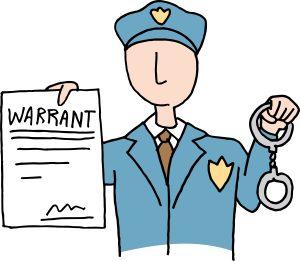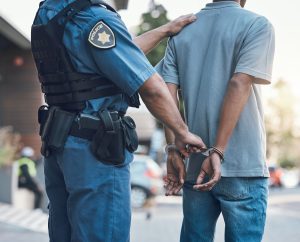The Fourth Amendment to the United States Constitution protects citizens from unreasonable searches and seizures. Police officers can’t simply walk up to any citizen and detain or arrest that person. There must be reasonable suspicion or probable cause that the person has, is, or is committing a crime in order to detain or arrest them.

Typically, if a police officer wants to make an arrest, they must seek an arrest warrant. In order to obtain an arrest warrant, the officer must establish to a judge that there is probable cause that a crime occurred and that the defendant committed the crime. The judge will then issue an arrest warrant if the judge determines there is probable cause exists.
However, a police officer does not always have to obtain an arrest warrant in order to make an arrest. There are exceptions to the arrest warrant requirement. Florida Statute §901.15 lays out when an officer can make an arrest without an arrest warrant. There are many exceptions to the arrest warrant requirement. For example, an officer doesn’t need a warrant to arrest a person for driving under the influence. The officer can simply make the arrest once observing all of the elements of the offense.
One of the exceptions to the arrest warrant requirement is if the person commits a felony, misdemeanor, or ordinance violation in the officer’s presence. If it is a misdemeanor or ordinance violation, the officer must make the arrest immediately or while in fresh pursuit.
The Fourth District Court of Appeal discussed this issue in Carlo v. State. In Carlo, police officers responded to a call that a person was threatening people and he had a knife. When they arrived, officers observed a group of people and one of those individuals pointed to a man, who turned out to be Mr. Carlo, and a woman at the top of a set of apartment complex stairs. The officer, pointing his gun at Mr. Carlo, directed Mr. Carlo to show his hands and Mr. Carlo became agitated. Mr. Carlo told the officer that he had a gun and officers handcuffed him. During a search incident to arrest, the officers found cocaine in Mr. Carlo’s pocket. He had a concealed firearms permit for the firearm. Mr. Carlo was arrested for disorderly conduct and possession of cocaine.

Mr. Carlo filed a motion to suppress the cocaine arguing that the officer had no probable cause that Mr. Carlo committed a crime. The officer didn’t observe any altercation between Mr. Carlo and any other individuals. The State argued that the officers confirmed with the people at the scene that Mr. Carlo had acted erratically and brandished a knife. The Circuit Court held that the arrest was lawful because the officer had reasonable suspicion that a crime occurred based on citizen informant information which justified a Terry Stop. And because the officers discovered the cocaine after the detention, they had probable cause to make an arrest for the possession of cocaine.
However, the Fourth District Court of Appeal disagreed. The officer must observe all elements of the offense to make a Warrantless arrest. The illegal arrest tainted the search and subsequent discovery of the cocaine. And the circuit court mistakenly attempted to justify the unlawful arrest under the U.S. Supreme Court’s decision in Terry. The District Court found that the officer did not have reasonable suspicion to detain Mr. Carlo under Terry because Mr. Carlo disclosed possession of the firearm, had a valid permit and the officer never observed Mr. Carlo with a knife. The officer didn’t testify that he was attempting to locate a knife or because he reasonably believed that Mr. Carlo was armed or dangerous or that the officer feared for his safety. Rather, the officer testified that the search was merely incident to the arrest. Therefore, the evidence did not support a Terry search and the District Court reversed and remanded the case for the trial judge to grant the motion to suppress.
 LGL partner Jeremy Lasnetski has more than 20 years of criminal trial experience. He has represented clients in both State and Federal criminal courts since 2008, including cases that have gone to the Court of Appeals. Before that, he was a state prosecutor between 2001 – 2008 prosecuting gun crimes, drug crimes, organized crime, homicides, and more. If you need a criminal defense attorney in Jacksonville, call Lasnetski Gihon Law at 904-642-3332.
LGL partner Jeremy Lasnetski has more than 20 years of criminal trial experience. He has represented clients in both State and Federal criminal courts since 2008, including cases that have gone to the Court of Appeals. Before that, he was a state prosecutor between 2001 – 2008 prosecuting gun crimes, drug crimes, organized crime, homicides, and more. If you need a criminal defense attorney in Jacksonville, call Lasnetski Gihon Law at 904-642-3332.
 Jacksonville Criminal Lawyer Blog
Jacksonville Criminal Lawyer Blog

